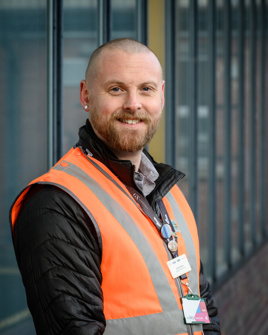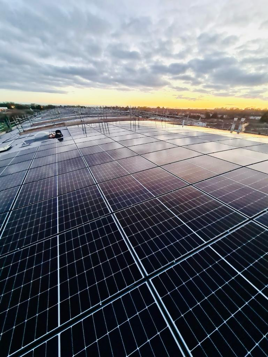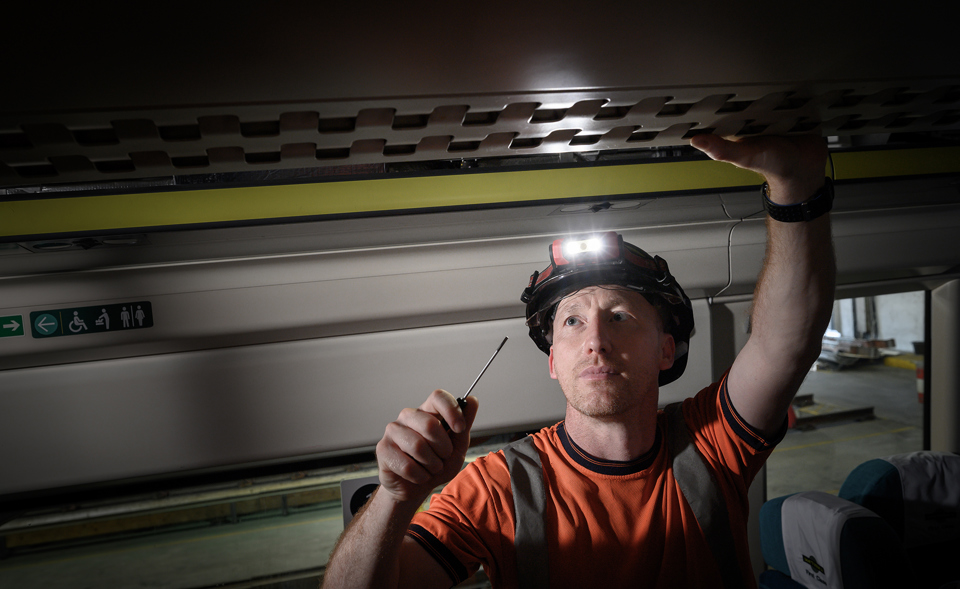Jason Brooker is Head of Environment for Govia Thameslink Railway (GTR), including its brands Southern, Gatwick Express, Thameslink and Great Northern. He has strategic responsibility for all areas of its environmental management.
Environmental management is important, particularly for an operator which has 260 locations including stations and depots under its belt, a fleet of 457 trains and an equally large supply chain to match.
Jason has worked on the railway for 13 years and has been Head of Environment for Govia Thameslink Railway (GTR) for the last nine years. He oversees everything from waste management to noise pollution, and biodiversity. But, increasingly, his role sees the pressing issue of reducing GTR’s energy consumption and carbon emissions, to meet its Net Zero target by 2050.
GTR’s Net Zero strategy and decarbonizsation plans are a collaboration. While it works on efficiencies at stations and depots, there's also wider collaboration to examine options.
Better together
 Jason Brooker Head of Environment Govia Thameslink Railway GOVIA THAMESLINK RAILWAY
Jason Brooker Head of Environment Govia Thameslink Railway GOVIA THAMESLINK RAILWAY
The operator has worked with Network Rail, other Train Operating Companies (TOCs) and Rolling Stock Companies (ROSCOs) to feed into the Sustainable Rail Blueprint led by the Rail Safety and Standards Board (RSSB). This industry-wide framework is rail’s first unified plan, providing an industry-wide guide to sustainability to the middle of this century.
“It's very easy to think of train operators as competitors, but when it comes to environmental management, climate change and biodiversity, it doesn't matter which train operator you are,” begins Jason.
“There's a massive amount of collaboration that happens, working together and sharing best practice - we've got to work together, or we can't do this.”
Jason talks about the ‘dilution’ of the Government’s Net Zero policy last September: “The politicising of climate doesn't help and policy needs to be clear. It doesn’t put much confidence in what we’re collectively trying to achieve. Clear policy targets that we can trust and that are driven forward with long-term thinking will help.”
GTR has identified three ‘emission scopes’. The first is direct emissions, generated from the burning of a fossil fuel to produce energy. For GTR, this covers diesel traction on two of its non-electrified routes, its road vehicles, gas-fuelled boilers - even refrigerant loss from air-conditioning units.
Its second scope covers indirect emissions where fuel is burnt elsewhere and transported to GTR, while its third encompasses emissions within its supply chain from the procurement of goods and services.
“Scope three accounts for about 89% of our total carbon emissions and that's quite common. Scope three usually has the biggest impact across organisations,” says Jason.
“Our scope two accounts for 10%, while our scope one is 1%.”
Is one scope easier to reduce than another, and how does GTR value the importance of each?
“You could sit there and think that scope one being our gas boilers and diesel traction at only 1% is probably not worth focusing on. It absolutely is – it’s incredibly important,” he explains. Like-wise, scope two accounts for nearly 130,000T annually of CO2.
“Decarbonisation of our diesel routes is one way of reducing our scope one emissions; for scope two, it’s reducing our reliance on grid electricity, through renewable energy and through energy efficiency programmes.
“We're looking at station efficiencies to reduce our energy draw. And, by looking at switchboard monitoring, we have a good idea of how much energy each of our stations uses.”
Challenges ahead?
“There are complexities around the way we work – we’re owned by Go-Ahead and Keolis, funded by DfT and rely on our infrastructure managers, Network Rail.
“Five years ago, the biggest challenge was getting the business to buy into what we're doing. There's now massive appetite for sustainability, and senior managers are really engaged - they're asking for advice and ideas.
“We never used to have the relationships we have now with other operators and NR. We’ve always had a good relationship – from an operational perspective – but now we’re coming together as a collective.
“Rail is a complex machine – that's what incites this collaboration, because individually we can’t solve all the problems, but working together, we can overcome complexities.”
Balancing cost
How does Jason feel about the pace of transition to Net Zero? And how is the balance between sustainability and cost of installation quantified?
“It’s about long-term planning - it's never been a secret the way contracts are set up within rail. We look at control periods and contract length, but also beyond contract length. You can’t calculate a return on investment with things like climate change impact and weather resilience. It's longer than our contracts, and DfT is accepting of that and realises we need to think longer-term.”
Jason keenly highlights innovation and GTR’s methods of problem-solving, citing its recent work with not-for-profit organisation Energy Garden.
“The old-fashioned solar energy model is paying a company ‘X’ amount to have solar panels installed, with a return of investment in ‘Y’ number of years, which you can then use. We're looking at it from a different perspective.
“Solar investment costs millions of pounds but in working with innovative and enthusiastic partners it's at zero cost to us. Energy Garden has funded our solar installs, and we buy the energy through a power purchase agreement, cheaper than from the grid. It's not a ‘money-maker’, but in partnering with them, the profit they make is funding local social value activities.”
 Energy Garden recently installed 932 photovoltaic panels on the roof of Govia Thameslink Railway’s (GTR’s) Cauldwell Walk depot. GOVIA THAMESLINK RAILWAY
Energy Garden recently installed 932 photovoltaic panels on the roof of Govia Thameslink Railway’s (GTR’s) Cauldwell Walk depot. GOVIA THAMESLINK RAILWAY
Asked if GTR has weaknesses in its decarbonisation plan, Jason explains, “We do have diesel fleets, and we’re operating on infrastructure that's a century old. With that comes challenges and complexities. ‘Weakness’ is an unfair word - ‘challenge’ is probably better.”
Curious to know if he feels the industry is on track to meet Net Zero plans, he widens the question to a national level: “We’re going at the pace that we're able to go. Nationally, I think more could be done, but it comes back to complexities. It’s not as simple as saying ‘we'll just pick up the pace’, or ‘we'll just plug more money into it’. We need more innovation and to be given the chance to be more innovative in our approaches.”
Data: a key to better control
The rail industry has ‘niche’ suppliers. Jason explains that GTR is starting its journey to reduce scope three (supply chain) emissions, and that most suppliers will be forced to develop their own Net Zero strategies by default.
“We had a workshop last week with our managers to begin developing a road map for scope three emissions. We’re improving our reporting on the data that we get from our suppliers. Solid primary data will give us a real snapshot of how things look, which allows us to work with our suppliers to bring emissions down.”
He adds, “Some of our suppliers are looking at their own Net Zero plans, but we can't just sit back and assume it. We're going to work with them to look at new opportunities.”
Jason and his team at GTR are further developing their decarbonisation road map, and RAIL expects further details to emerge from its Net Zero strategy update in spring, 2024.



















Login to comment
Comments
No comments have been made yet.